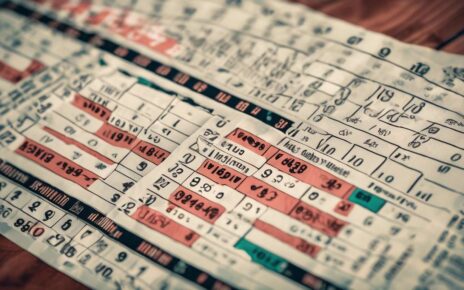As enthusiasts of the thrilling world of betting, we often find ourselves immersed in the excitement of odds and outcomes. However, to truly grasp the nuances of our favorite pastime, understanding how odds are meticulously calculated is essential.
In this article, we aim to unravel the complexities of this fascinating process, shedding light on the mathematical and statistical principles that underpin the betting industry. By exploring the different types of odds—fractional, decimal, and moneyline—we will demystify how bookmakers assess the likelihood of various events.
Types of Odds:
- Fractional: Commonly used in the UK, these odds represent the ratio of profit to the stake.
- Decimal: Popular in Europe, these odds show the total payout rather than just the profit.
- Moneyline: Predominant in the US, these odds indicate how much profit you would make on a $100 bet.
Factors Influencing Odds:
- Team Performance: Current form and player statistics.
- Historical Data: Past match results and head-to-head statistics.
- Public Sentiment: Popular teams or players may have skewed odds due to public betting patterns.
Our journey will not only enhance our appreciation of the strategies involved but also empower us to make more informed decisions.
Join us as we embark on this enlightening expedition, transforming our betting experience from mere chance to an informed and calculated endeavor.
Understanding Fractional Odds
Fractional Odds Overview
Fractional odds are commonly used in the UK and are a traditional way to understand potential returns on bets. For example, when we see odds of 5/1:
- It means for every £1 wagered, one could win £5.
- The total return includes the original stake, so a £1 bet would return £6 in total.
This format connects bettors to a long-standing tradition, offering a shared cultural experience.
Historical Evolution
By examining historical data, we can observe how fractional odds have evolved and adapted over time. It’s fascinating to analyze how past events influence current odds, creating a deeper connection to the betting world.
Role of Statistical Models
Statistical models are invaluable in this journey:
- They provide insights by interpreting historical data.
- Allow us to predict outcomes with greater accuracy.
- Help us make more informed betting decisions.
Community and Knowledge
Exploring fractional odds together strengthens our bond with a community that values:
- Knowledge
- Shared experiences
This collective understanding enhances our overall confidence in betting decisions.
Deciphering Decimal Odds
Decimal odds offer a straightforward way to calculate potential returns and are popular in Europe and Australia. These odds reflect the total payout rather than just the profit, which makes them easier for many to understand compared to fractional odds. Unlike fractional odds, more common in the UK, decimal odds provide a clearer picture without the need to convert fractions.
Calculating Potential Returns:
-
Multiply your stake by the decimal odds.
- For example, if you bet €10 on odds of 2.5, your return would be €25, including your original stake.
This format is appealing to those who enjoy simplicity and clarity in their betting experience.
Importance of Understanding Decimal Odds:
- Understanding decimal odds is essential for making informed bets.
- Bettors often rely on historical data and statistical models to predict outcomes and set odds accurately.
By doing so, bettors feel more connected and informed, creating a community where shared knowledge and insights guide smarter decisions in the world of betting.
Unraveling Moneyline Odds
Moneyline Odds: A Staple in American Sports Betting
Moneyline odds are a fundamental component of American sports betting, focusing on the straightforward question: who will win? Unlike Fractional Odds, which are popular in the UK, moneyline odds emphasize the likelihood of a winner.
Understanding Moneyline Odds
- Being part of a community of bettors means understanding these odds to feel connected and informed.
- Moneyline odds simplify the betting process by concentrating on the outcome rather than the margin of victory.
Using Historical Data and Statistical Models
-
Historical Data: We rely on past performances and outcomes to guide our betting choices. This data helps us make more informed decisions by providing a historical context.
-
Statistical Models:
- These models use complex algorithms to predict outcomes based on current variables and trends.
- They might seem daunting, but they are essential tools for understanding the myriad factors that influence a game.
Engaging with the Betting Community
As we engage with moneyline odds, we are not merely guessing. Instead, we become part of a knowledgeable community that values precision and insight. Together, we navigate the dynamic landscape of sports betting, continuously learning and sharing our experiences.
Impact of Team Performance
Team performance plays a crucial role in shaping betting odds, as it directly influences our predictions and strategies. When we dive into the world of betting, understanding how a team’s current form can sway the odds is essential.
Fractional odds reflect this by adjusting to the performance metrics of teams:
- A team on a winning streak will likely have shorter odds, indicating they are favorites.
- A struggling team will have longer odds.
In our community, we value the insights drawn from statistical models that analyze team performance. These models consider various factors to predict future performances:
- Player form
- Injuries
- Recent match outcomes
By aligning these insights with our betting strategies, we feel more connected and informed.
Although we rely on a blend of intuition and data, statistical models empower us to make educated decisions. As we gather around to discuss our picks, team performance becomes a unifying factor, driving our collective confidence in the bets we choose.
Importance of Historical Data
The Importance of Historical Data in Betting Strategies
We can’t overlook how vital historical data is in refining our betting strategies and predictions. As a community of betting enthusiasts, we rely on past performances to guide our future bets, helping us feel more connected to the outcomes we predict.
Developing Robust Statistical Models
By analyzing historical data, we can develop robust statistical models that enhance our understanding of fractional odds. These models allow us to:
- Identify patterns and trends that aren’t immediately obvious.
- Gain an edge in making informed decisions.
The Narrative Behind the Numbers
When we look at historical data, we’re not just seeing numbers; we’re glimpsing the narrative of past events that shape current odds. This shared understanding helps us:
- Bond over insights and strategies.
- Foster a sense of belonging as we collectively decipher the complexities of betting.
Transforming Raw Figures into a Communal Language
Utilizing historical data, we can transform raw figures into a communal language, enriching our predictions and refining our approaches. Together, we leverage this knowledge to:
- Sharpen our betting acumen.
- Strengthen our shared community.
Influence of Public Sentiment
Public Sentiment and Betting Odds
Public sentiment plays a crucial role in shaping betting odds and can significantly impact our decision-making process. We often find ourselves influenced by the collective opinions and emotions surrounding a particular event.
This influence becomes evident when examining fractional odds, which adjust as public sentiment shifts. When a team or player gains popularity, their odds may change, not necessarily because of their performance, but due to the weight of public opinion.
Balancing Historical Data and Public Sentiment
We must consider how historical data interacts with public sentiment. While historical data provides a factual basis, public sentiment adds a layer of human emotion and bias.
When analyzing these odds, it’s essential to balance:
- The rationality offered by statistical models
- The unpredictability of public emotion
Informed Decision-Making
By understanding this dynamic, we can better navigate the betting landscape, feeling a part of a community that shares insights and perspectives.
Acknowledging public sentiment helps us make informed decisions, ensuring we’re not just following the crowd blindly.
Statistical Models in Odds Calculation
We rely on statistical models to provide a structured and objective approach to calculating betting odds. By leveraging these models, we create a sense of unity and shared understanding within our community of bettors.
Statistical models allow us to analyze vast amounts of historical data, giving us insights into patterns and trends that might otherwise go unnoticed. This data-driven approach helps us set fractional odds with precision, ensuring fairness and transparency for everyone involved.
When we dive into historical data, we uncover valuable information about past performances, player statistics, and team dynamics. This knowledge empowers us to make informed predictions and fosters a sense of belonging among those who share our passion for betting.
Our analytical approach, grounded in statistical models, enhances our ability to anticipate outcomes with greater accuracy. By embracing these methods, we’re not just placing bets; we’re engaging in a collective journey of exploration and discovery, bringing us all closer together in the pursuit of understanding and success.
Enhancing Betting Strategy
To enhance our betting strategy, we focus on identifying key factors that influence outcomes and leveraging them to our advantage.
By analyzing Fractional Odds, we gain a clearer understanding of potential returns and implied probabilities. This helps us make informed decisions.
Our community thrives on shared insights, so we delve into Historical Data together, examining past performances and trends. This collective effort strengthens our predictive abilities and fosters a sense of camaraderie.
Statistical Models play a crucial role in refining our approach. We utilize them to process complex datasets, allowing us to discern patterns that might not be immediately apparent. These models help us quantify variables and adjust our strategies accordingly.
As we incorporate advanced tools, like:
- regression analysis
- machine learning algorithms
we enhance our accuracy and confidence.
Together, we transform data into actionable insights, creating a supportive environment where everyone can improve. Our shared knowledge and collaborative spirit ensure we’re not just betting—we’re betting smarter.
How do bookmakers ensure fairness and transparency in their odds calculations?
Ensuring Fairness and Transparency
We ensure that bookmakers maintain fairness and transparency in their odds calculations by implementing rigorous checks and balances.
Odds Calculation Methods
Bookmakers use sophisticated algorithms and statistical models to determine odds that accurately reflect the probabilities of various outcomes.
Continuous Monitoring and Adjustment
- By constantly monitoring their calculations
- Adjusting based on real-time data
- Considering market trends
Bookmakers strive to provide a level playing field for all bettors.
Building Trust and Credibility
Transparency in these processes builds trust and credibility within the betting community.
What role do external factors like weather conditions play in odds calculation?
Weather Conditions and Odds Calculation
Weather conditions can greatly impact odds calculation by influencing a team’s performance or the outcome of a game. Rain, wind, or extreme temperatures can level the playing field or favor one side, affecting the final result.
Impact on Bookmakers:
Bookmakers must consider these external factors to ensure accurate and fair odds. By incorporating weather data into their calculations, they can provide more comprehensive odds that reflect the potential impact of such conditions on a game.
Key Considerations:
- Rain: May affect ball handling and speed.
- Wind: Can alter ball trajectory and player performance.
- Extreme temperatures: May impact player stamina and strategy.
By understanding and adjusting for these factors, bookmakers can enhance the accuracy of their odds, providing a better reflection of the game’s potential outcomes.
How do odds calculation methods differ across various sports or events?
When it comes to different sports or events, odds calculation methods can vary significantly. Each sport or event has its unique characteristics that influence how bookmakers set the odds. Understanding these differences can help us make more informed betting decisions across various sports and events.
Factors Influencing Odds Calculation:
-
Team Performance: Bookmakers analyze past performances and current form to gauge a team’s potential outcome.
-
Player Injuries: The absence or presence of key players can significantly affect a team’s chances and the odds.
-
Historical Data: Past matchups and results are considered to predict future outcomes.
-
Betting Patterns: Bookmakers adjust odds based on how people are betting to balance their risk.
By considering these factors, one can better understand the rationale behind the odds and make more strategic betting decisions.
Conclusion
Now that you’ve delved into the world of odds calculation in betting, you have gained valuable insights into the various types of odds, factors influencing them, and strategies to enhance your betting game.
Types of Odds:
-
Fractional Odds: Commonly used in the UK, these express the net total that will be paid out to a bettor should they win, relative to their stake.
-
Decimal Odds: Popular in Europe, these show the total amount one will receive for every unit bet, including the initial stake.
-
Moneyline Odds: Predominantly used in the US, these indicate how much money you need to bet to win $100 or how much you will win if you bet $100.
Factors Influencing Odds:
-
Team/Form Performance: Recent performance and historical statistics.
-
Weather Conditions: Impact on game dynamics and player performance.
-
Injuries/Suspensions: Key players missing the game can shift odds significantly.
-
Market Movements: Changes in betting patterns and public opinion.
Strategies to Enhance Betting:
-
Research: Always start with comprehensive research on the teams, players, and conditions.
-
Value Betting: Look for odds which appear higher than they should be, based on your research.
-
Bankroll Management: Set a budget and stick to it to avoid unnecessary losses.
-
Diversify Bets: Don’t put all your eggs in one basket; consider multiple bets to spread risk.
By understanding how odds are calculated, you are better equipped to make informed decisions and increase your chances of success in the exciting realm of sports betting.
Next Steps:
- Keep exploring and refining your strategies.
- Continuously monitor and adjust based on outcomes and new insights.
- Engage with betting communities to exchange knowledge and stay updated.
Happy betting!




